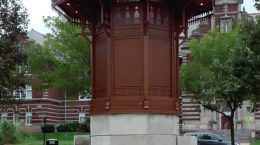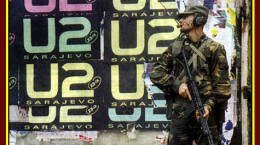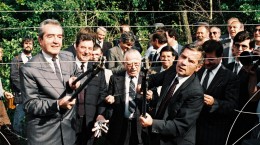He had been wounded by political scandal and his positions on international issues were still viewed as in development in 1992; however Senator John McCain was undoubtedly an American war hero and I was about to face him on CNN’s “Crossfire” debate program. Senator McCain’s position on foreign policy was taking shape but not yet frozen in political trench warfare. Nonetheless, the initial perspective was that of an isolationist even as he favored a “strong military.” International issues were not particularly highlighted in his agenda but generally demoted to the bottom of his priority list. The international issue of the period was the conflict, aggression and genocide directed against the newly independent Bosnia and Herzegovina (BiH) and whether the United States had a foreign policy interest.
As one born in BiH and its then first Ambassador to the United Nations I was designated to face what was assumed to be a more isolationist position of Senator McCain. As a young boy who had immigrated to the United States from a non-democratic and communist Yugoslavia, America not only represented the new home that welcomed me and personal liberty but that “exceptional” state that stood out as the defender of tolerance, diversity and the rule of law. After the collapse of the dark authoritarianism of the Soviet Union that had invested decades into its own global domination agenda, the US was the only remaining superpower that could mold a more positive global set of priorities. Most of the world’s population, if not always its array of self-decreed and/or purportedly divinely anointed leaders, looked up to America as the new promise, a more or less rough model of personal freedom and economic opportunity for their own countries and democratic institutions. Ending the conflict, aggression and genocide in BiH not only was the first test to US’s new leadership but Bosnia was in many ways under assault due to the very characteristics it shared with America of diversity of religions and ethnicities that had been the mosaic building block defining the US during its most progressive and positive evolution.
CNN was already the premier news channel 25 years ago. Crossfire was one of its signature programs on events that were debated by two prominent guests representing generally opposing views. I had already appeared a couple of times and had gotten to know a few of the hosts, including Pat Buchannan, who had rejuvenated the “America First” rhetoric including in his presidential campaigns. Off-screen he was genial but on he represented what most believed was, well, an isolated splinter of America’s right. Their argument was that the US had “no dog in the fight” in the brutality consuming Bosnia & Herzegovina. However, even then it was tinged with a selectivity based on religion, race and ethnicity in determining when the US would become involved. Pat Buchannan viewed Senator McCain as his champion, the war hero that would convincingly argue that the US had no business in being involved. In my view though they missed the point. Setting aside ethics or global strategic interest, the US now would always be seen as involved simply by its status of lone super-power. America would and could not be seen as beyond any issue that threatened “international peace and security.”
The GOP of three decades earlier was by no means the isolationist but opportunist interventionist party of Donald J. Trump. The progressive center-left had seen BiH as a test for America’s leadership and was directed by a broad rainbow of human rights and American Jewish organizations who found new relevance to the historic context of “never again.” Bill Clinton had been elected President in 1992 in part of a platform of a more interventionist US policy in BiH, (later to be in effect suffocated by a ménage-de-trois of convenience between caution, bigotry and equivalency). From Senator Bob Dole to the neo-Cons, the Republican Party had made Bosnia a cause, if for no other reason than to give further meaning to “American exceptionalism,” (and reflect efforts by chauvinists like then French President Mitterand who sought to sideline the US from European defense and who was himself motivated by anti-Islamic stereotyping and his long-buried past as Vichy anti-Semitism). The array of sympathetic audiences included Reagan personalities as Oliver North and conservative Evangelicals, white and black. (I spoke to a sympathetic reception at Rita McEntire’s church in Nashville).
As our debate began, Senator McCain as expected echoed the isolationist language of isolationism. Unlike the future BBC debate program “Hardline,” (on which I was one of its first guests facing-off with journalist and antagonist by duty John Sebastian), Crossfire was confrontation X 2, as 4 protagonists did verbal duel, with rhetorical crossfire coming both from friendly fire as well as “the other side.” For one with my background and then current duties, I saw BiH not only as a service to my country of birth during its moment of greatest need but also as complementary and consistent with my American values and the strategic interests of the US. I frequently interchanged the term “we” to refer to my American as well as Bosnian sense of identity.
At one point when I argued for American interests/values at stake in BiH, Senator McCain asked with tinge of cynicism, “what’s this we stuff?” My reply was that I saw this as both complementary and as an extension of my responsibilities/duty as an American. The US is better-off with the growth of democracy, free society and economic freedom on a global scale. Senator McCain did not immediately respond. However, after our program concluded, the producers at CNN studios in NYC told me that I had a phone call from Senator McCain who was in the CNN Washington studios. He said, “Ambassador Muhamed, I would like to apologize to you in anyway I may have appeared to question your American identity or belonging.” There was no other rationalization, but an American hero who had spent years in the military service of our US and then as POW felt it important enough to include me in his definition of loyal American.
Senator McCain, as I, never stopped evolving our ideas of what its means as rights, responsibilities and inclusion to be an American. This was not McCain being an interventionist as some would seek to diminish his concerns and calls for action in Syria, Ukraine, and yes, the Balkans where he became a stalwart voice for bringing BiH into the Euro-Atlantic family as partner and contributor. I would like to think that our debate now a quarter century earlier had something to do with John McCain’s evolution. However, for me the apology coming from the most recent of many generations of McCains serving was enough to tell me that I belonged and to be honored to be in the company of Americans like him.
John McCain’s passing though may have prematurely extinguished another McCain transition that may have become most obvious in the time of “rhetorical nationalism” or populism where those that avoided service, like Trump, would lecture Americans on patriotism and direct their mouth power on globalists. John McCain was an internationalist, He also I believe foresaw how “global citizens” are not only consistent with their “national identity” but in the new inevitably more interconnected world there was a complementarity. He urged the US Senate to adopt the UN Treaty on persons with Disabilities, even as most of his Republican colleagues rejected to do so simply to appeal to an ever more viral populism, despite the fact that the UN Treaty was modeled after, and in word and purpose was the same as a US law already adopted.
Having been in the front of those who sought both alliance and affinity with the US in ending the war against Bosnia over two decades earlier, I know that at times America’s involvement may be not what was desired in full or even contrary to the hope However, mistakes, failure may be defined by omission as much as acts of misdirected commission, particularly for a global power. The US almost inevitably does become involved, either by its own design, scheme of manipulators or by plan of those seeking to pull it in as a convenient target to project their own willingness to take on the “most mighty power” on earth. The rise of China, the reemergence of an expansionist Russia under Putin or the birth of ISIS are evidence of the latter. These all may represent a challenge to the freedoms if not an outright threat to both Americans and global citizens. In his last actions as leader, I have come to think of Senator John McCain as both American patriot and global citizen. Did McCain see the future similarly where these identities were not only consistent but the most forward leaning perspective of global citizen was built on the same foundations as that of American patriot?
“mo”
Ambassador Muhamed Sacirbey
@MuhamedSacirbey



